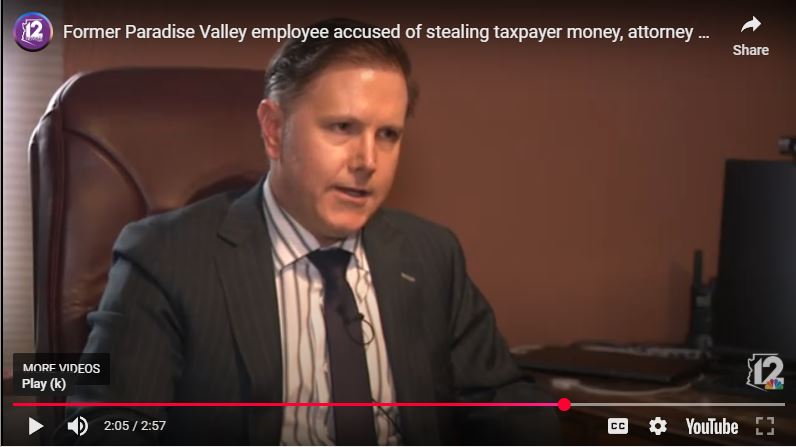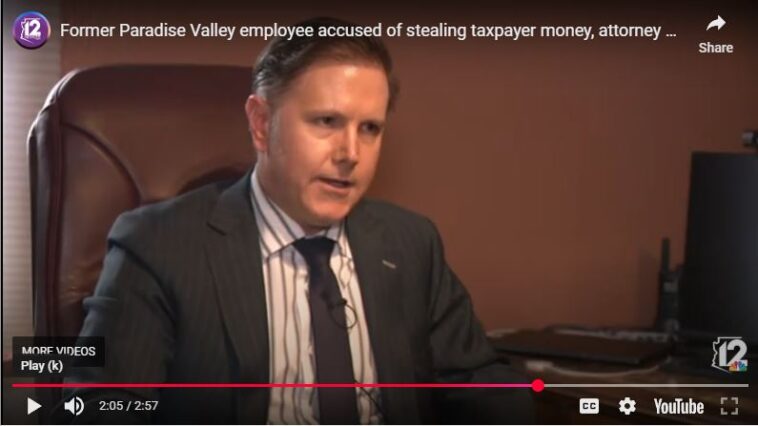
Paradise Valley’s Misused Funds Scandal: Unraveling Tangled Issues in Public Administration
In recent times, Paradise Valley has found itself at the center of a nerve-racking public debate over alleged misappropriation of taxpayer funds. The controversy emerged following claims that a former Public Works Director, Brent Skogland, may have used public money on purchases with questionable relevance to official duties. With local community trust on the line and the media buzzing with preliminary accounts, this case presents several tricky parts that demand careful, unbiased discussion.
At its core, the situation involves longstanding allegations brought to light by a former employee who noted budget discrepancies within the town’s Public Works Department. Such inconsistencies, combined with investigations into transactions like off-roading lights, a pool motor, RV supplies, and even clothing allegedly bought for personal use, have raised many questions. Reportedly summing to nearly $10,000, these transactions have led to serious law enforcement involvement and potential charges ranging from theft and fraud to the misuse of taxpayer funds.
Examining Employee Observations and the Start of Budget Discrepancies
Jerry Cooper, a long-time employee of over eighteen years, was the person who first noticed irregularities within the town’s budget line items. His observations have become a focal point in discussions that dig into the tangled issues of government financial oversight. Employees and residents alike are puzzled by the subtle parts of government spending and wonder how such transactions could slip through the cracks.
While many administrative systems have controls in place, this case highlights that sometimes, even routine budget reviews can unveil hidden complexities that had not been anticipated. The following table breaks down some of the reported transactions that have raised eyebrows:
| Item Purchased | Potential Issue |
|---|---|
| Off-roading lights | Questionable official need |
| Pool motor | Possible misuse in non-official capacity |
| RV supplies | Indicates potential personal use |
| Clothing for a spouse | Not aligning with standard Public Works procurement |
These items are but a few indicators that the situation might be more complex than initially assumed. When officials and observers take a closer look at the little details in such cases, they often reveal a pattern that calls for rigorous review and accountability.
Defense Attorney’s Perspective: Pushing Back Against Premature Media Trials
Defense attorney Josh Kolsrud, representing Brent Skogland, has voiced deep concerns over the media’s role in shaping public opinion before formal charges have been brought forward. In a detailed interview with local news outlets, Kolsrud noted the nerve-racking scenario of public trials where initial police statements are given undue weight. His argument stresses that premature public judgment could potentially compromise the defendant’s right to a fair trial.
Lawyers in such situations often stress the importance of working through the legal system rather than being swept up in what might be an overwhelming media narrative. Kolsrud’s position, expressed in clear and strong language, calls for a judicial process that focuses on the fine points of the case rather than relying on media soundbites. He insists that:
- The charges brought forward must be carefully vetted in a court of law.
- Every single piece of evidence, including the less obvious details, should be rigorously examined.
- The case should not be reduced to a headline or a public spectacle until all proving points have been presented.
By challenging early media trials, Kolsrud is essentially demanding that his client be allowed the benefit of a full and thorough judicial review. His comments underscore a broader debate on the balance between media influence and the fundamental rights of individuals accused of misconduct.
Understanding the Hidden Complexities: The Fine Points of Public Fund Management
When government funds are at stake, the discussions often become full of problems and emotions. In this case, the alleged misuse of taxpayer dollars in Paradise Valley reminds us that even established financial processes can sometimes be vulnerable to the subtle parts of mismanagement. Public trust is built on transparency, and when issues like these surface, the community naturally demands to know whether public funds were used appropriately or not.
The case also shines a spotlight on the need for robust internal controls within public institutions. Consider the following points that are deemed essential in ensuring fiscal responsibility:
- Regular audits by independent agencies.
- Strict monitoring of budget allocations and expenditures.
- Clear protocols regarding non-standard purchases.
- Open channels for employees to report suspicious activities.
These points, though seemingly simple, address the tricky parts and hidden complexities that often lead to public fund mismanagement. They also reveal that aside from legal implications, there is a broader conversation about the structure of municipal financial management that must be explored.
Community Impact: How Allegations Influence Public Trust and Governance
The allegations against the former Public Works Director have done more than just spark legal debates—they have also had a tangible impact on community morale and trust in local government. Residents of Paradise Valley are reeling from news of potential financial mismanagement, and many feel that the case is a clear indicator of the need for greater accountability in public office.
A closer look at the community reaction reveals several key sentiments:
- Demand for Transparency: Residents insist on clear explanations and full disclosure regarding public expenditures.
- Expectations of Accountability: Local government officials and employees should face consequences commensurate with their actions, much like any private citizen would if found guilty of similar issues.
- Distrust of Preliminary Reports: Many community members are wary of forming opinions based solely on early police or media accounts, preferring to reserve judgement until the legal process unfolds.
When discussing the need for accountability, it is important to recognize that public institutions have a responsibility to both manage funds responsibly and to maintain the public’s trust. The fine points in the financial decision-making process cannot be skimmed over, as any misstep might ultimately compromise community well-being.
A Closer Look at the Legal Landscape: Tricky Parts of the Judicial Process
Legal battles of this nature are always full of twists and turns. On one side, there is the prosecution’s effort to build a compelling case based on tangible evidence and witness accounts. On the other, a defense team is tasked with untangling each piece of evidence to prove innocence. In the Paradise Valley case, the judicial process is at a critical juncture, with several key aspects needing further exploration:
Analyzing the Burden of Proof
In any court case, the burden of proof rests on the prosecution. However, the presence of preliminary evidence based on accounting discrepancies and the seizure of personal items can complicate this challenging balance. The fine details of each transaction, from the purpose to the context in which the purchase was made, are essential in painting an accurate picture of the events.
It is vital to remember that:
- The purchase records alone do not prove intentional wrongdoing.
- There may be reasonable explanations for these expenditures that align with legitimate needs.
- The context and intent behind every transaction are as important as the numbers in the ledger.
Media Influence Versus Courtroom Evidence
Another tricky part is the impact of media coverage, which can often blur the line between accusation and conviction. Defense attorney Josh Kolsrud has stressed that while media reports focus on preliminary police statements and initial findings, they do not capture the full, sometimes complicated pieces of evidence to be presented in court.
Kolsrud’s perspective rings especially true in an age where social media and news outlets can rapidly disseminate information before a case is fully understood. The risk is that judges, juries, and the public might be swayed by sensational headlines rather than the nitty-gritty evidence – a possibility that could undermine the fairness of the judicial process.
Evaluating the Possible Outcomes
As this case continues to evolve, it is worth taking a closer look at the potential outcomes. Although allegations suggest misuse of funds, the courtroom will serve as the definitive arena for determining guilt or innocence. This division between public opinion and legal proof is where the band of justice must find its equilibrium. Potential outcomes include:
- Case Dismissal: If evidence is found lacking or misinterpreted, charges might eventually be dropped.
- Conviction: Should the prosecution successfully prove misappropriation beyond a reasonable doubt, legal penalties will follow.
- Settlement or Plea Agreement: In some cases, disputes of this nature might conclude with negotiated terms before reaching a full trial.
Regardless of the outcome, the case serves as a stark reminder of the tricky pieces and subtle details inherent in legal proceedings involving public funds.
Steps Toward Ensuring Accountability in Municipal Expenditures
Beyond the immediate legal debate, the Paradise Valley case prompts a broader discussion on how municipalities can make their financial operations more transparent and resilient. Ensuring that public funds are managed with the utmost care is not only a legal obligation but a moral one as well. Here are several measures that cities can consider:
Implementing Rigorous Internal Controls
Municipalities must establish clear financial guidelines to prevent misuse. This involves setting up robust audits and employing independent oversight bodies dedicated to reviewing public expenditures. Specific actions include:
- Regular, unannounced audits of major budgetary components.
- Dedicated financial review committees comprised of both internal and external experts.
- Clear and strict policies outlining what constitutes acceptable and unacceptable purchases.
These steps can help to straighten out any confusing bits in financial practices, ensuring that every transaction is in line with the institution’s intended purpose.
Encouraging Whistleblower Protections
Employees often have the clearest view of the subtle parts of internal operations. In light of the Paradise Valley controversy, protecting staff who raise concerns is essential. By:
- Offering legal safeguards for whistleblowers,
- Creating anonymous channels for reporting irregularities, and
- Providing incentives for transparency,
municipalities can empower employees to get into the details without fear of retribution. Such measures are key in ensuring that potential issues are flagged and addressed early, before they escalate into nerve-racking scandals.
Balancing Media Narratives and the Right to a Fair Trial
One cannot ignore the profound influence of the media in shaping public opinion, especially in cases garnering widespread attention. The Paradise Valley scandal is a prime example of how off-putting media narratives can cloud judgment while the legal process is still in motion. Many community members have expressed frustration at how early coverage has turned a case—and an individual—into a spectacle.
Key observations about the media’s role include:
- Sensational Headlines: Often prioritize shock value over nuanced reporting.
- Early Narratives: Can jump to conclusions before all the information has been made available in court.
- Public Pressure: May inadvertently influence judicial proceedings by creating an atmosphere of anticipation and fury.
Defense counsel like Josh Kolsrud argue that once all the evidence is brought before a court, the nerve-racking public narrative will have to contend with a sober reality founded on the law and concrete evidence.
Lessons for Public Officials: Steering Through Government Spending Pitfalls
Public officials hold the super important responsibility of managing resources meant for the collective well-being of the community. The Paradise Valley investigation serves as a cautionary tale for those in public service. It demonstrates that:
- Every purchase, no matter how minor it may seem, should be justifiable within the context of official duties.
- Financial transparency is not an option but a must-have component of trustworthy governance.
- Failure to adhere to strict procurement processes may lead not only to legal consequences but also to a loss of public confidence.
Officials are encouraged to be proactive in reviewing policies and procedures. Regular training sessions on public fund management and internal ethics can help prevent the missteps that have led to the current controversy.
Charting a Path Forward: The Critical Role of Due Process
At the heart of this controversy lies the legal principle of due process, which guarantees every citizen the right to a fair judicial proceeding. Defense attorney Josh Kolsrud’s insistence on ensuring that his client is not subjected to media-accelerated judgment is a strong reminder of this essential tenet. The case underscores several important points:
- Legal proceedings must stand on the evidence presented in court, not on preliminary findings or sensational media reports.
- The right to a fair trial ensures that all subtle details, including any potentially exculpatory evidence, are considered.
- Both the defense and the prosecution are required to figure a path through a paper trail that includes both obvious numbers and the tricky parts behind each transaction.
By defending the principle of due process, legal experts emphasize that no one should be forced to prove their innocence in the court of public opinion before the complete and complete facts are laid out in a courtroom.
Community Reflections: A Call for Greater Transparency and Reform
The unfolding narrative in Paradise Valley has sparked a broader community dialogue that goes far beyond a single case. Residents have raised significant concerns about the management of public funds and the need for structural reform to prevent similar situations in the future.
This community reaction can be summarized by several super important calls to action:
- Enhanced Oversight: Residents argue for more robust governmental oversight and external audits that can uncover even the most subtle details in public spending.
- Regular Reporting: Community members seek straightforward and periodic updates on budget allocations and financial decisions, ensuring that every transaction is out in the open.
- Stricter Controls: There is a desire for reform in procurement policies to avoid purchases that might be misinterpreted or exploited for personal gain.
- Increased Community Involvement: By encouraging local oversight committees, residents hope to steer through potential pitfalls before they become overwhelming issues.
In the end, the community’s push for transparency is as much about holding public officials accountable as it is about preserving the integrity of public funds. With the stakes this high, every expenditure is on notice, and every minor twist in the process might be subject to intense scrutiny.
Comparative Analysis: Similar Cases and Policy Implications
When examining the Paradise Valley case, it is useful to compare it with other similar incidents where public funds were put under the microscope. Across various municipalities, allegations of misused taxpayer dollars have led to calls for policy reforms and overhauled internal management processes. Such comparisons offer valuable lessons:
| Municipality | Issue Reported | Outcome/Action |
|---|---|---|
| City A | Irregular expenditures on non-essential services | Policy reforms and external audits initiated |
| City B | Misallocation of funds in public projects | Office shake-ups and introduction of tighter controls |
| City C | Unauthorized purchases by officials | Legal action against implicated officials and community oversight boards set up |
These examples illustrate that when government spending becomes riddled with issues, the result can be sweeping policy changes that impact not only the accused individual but also the broader framework within which public money is managed.
Trial Prospects and the Road to Justice
As the legal process moves forward, both sides—the prosecution and the defense—are preparing to work through the myriad of complicated pieces involved in this case. Prosecutors must now present a well-organized argument that links each questionable transaction to a pattern of mismanagement. Meanwhile, the defense is bid to strategically poke around these fine points to clearly separate legitimate expenses from alleged misuse.
The courtroom battle that lies ahead will likely cover subjects including:
- The origin and chain of custody of the disputed funds.
- The context in which each purchase was made and its conformity to policy standards.
- The role of internal checks and whether any previous irregularities had been flagged for review.
Both legal teams will have to manage their way through a host of twisted turns. Their success—or failure—will not only impact the lives of public officials like Brent Skogland but also set precedents for future cases involving public fund management.
Expert Opinions: Insights from Legal and Financial Analysts
In matters of alleged public fund misuse, multiple experts contribute critical viewpoints that add depth to the conversation. Legal analysts have weighed in on the challenges associated with early media portrayals, while financial auditors offer insight on the oversight needed to prevent similar occurrences. Their contributions underscore several key points:
- Due Process Over Public Opinion: Legal experts repeatedly stress the importance of not conflating allegations with guilt, emphasizing that only a rigorous judicial process can deliver true justice.
- Financial Accountability: Auditors and financial specialists advocate for more systematic and routine checks—measures that can help detect even the most confusing bits in large budgetary frameworks.
- Systemic Reforms: Both camps agree that systemic changes in procurement processes and financial oversight can reduce the risk of mismanaged funds, thus restoring trust in municipal governance.
These expert opinions serve as a reminder that while this case might appear to revolve around a single individual’s conduct, its implications stretch far wider. They influence how public institutions monitor spending and uphold fiscal responsibility, thereby affecting future governance models.
Conclusion: Striking a Balance in a Tense Environment
The unfolding drama in Paradise Valley serves as an important case study in managing the delicate dance between the right to a fair trial and the equally important need for transparency and accountability in public office. The tangled issues of alleged financial mismanagement raise numerous questions about how municipal funds are handled, what oversight measures are in place, and how media narratives can either clarify or distort the facts.
Defense attorney Josh Kolsrud’s forthright stance is a reminder that in any trial, every subtle detail matters. His insistence on steering clear of early media-based judgments underlines the core principle of due process—a principle that assures every citizen of a fair hearing, irrespective of public opinion.
At a time when community trust is wavering, this case also offers an opportunity for systemic reform. The lessons learned from the Paradise Valley scandal should prompt local governments to figure a path toward more transparent practices, stronger internal controls, and protective measures for whistleblowers. Not only will this approach help prevent similar issues in the future, but it also reinforces the key idea that public funds must be treated with the utmost care.
Looking ahead, both the legal process and community oversight will be critical in determining the ultimate outcome of this case. Whether Brent Skogland is ultimately exonerated or found guilty, the ripple effects of this controversy will likely stimulate much-needed discussions on how to refine public financial management.
In the end, striking a balance in such a tense environment relies heavily on the willingness of all parties involved—public officials, legal professionals, media houses, and community members—to work together toward a system that prioritizes accountability, fairness, and honesty.
This case is a stark reminder that the twists and turns of public administration and legal proceedings are filled with complicated pieces. However, by addressing these challenges head-on, and not rushing to judgment based solely on early reports, society can hope to build a more transparent, accountable, and just system that truly serves the public interest.
Read more about this topic at https://kolsrudlawoffices.com/attorney-josh-kolsrud-speaksout-about-client-brent-skoglund/
Related articles you might like
Boston nonprofit accused of misusing $32000 in taxpayer …
Recognize tax scams and fraud


